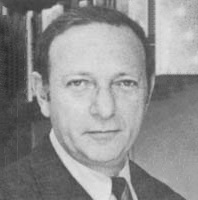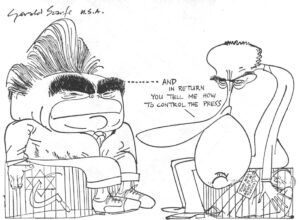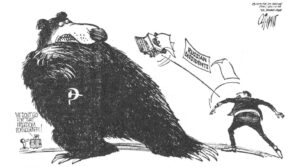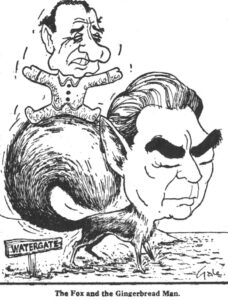Robert Kleiman
- 1972

Fellowship Title:
- Europe Beyond the Cold War
Fellowship Year:
- 1972
“The Real Question…Europe’s Security”
VII. Preventing Nuclear War
London, England September 24, 1973 In April 1969, long before the NATO allies had reason to be concerned about President Nixon’s later unilateral negotiations with Russia, Henry Kissinger told a White House visitor that the President believed a “profound transformation” of Soviet-American relations could be achieved. Washington’s step-up in the missile race and its much criticized delay in opening the Soviet-American strategic arms limitation talks — linking SALT to progress on other issues such as Vietnam, the Middle East and Berlin — stemmed from a decision by Mr. Nixon to go slow because he wanted to go far, farther paradoxically than some of his critics, and advisers, felt was feasible. The President’s aim was described as nothing less than assuring that “the danger of nuclear war would be lifted from the world.” “If the Middle East, Vietnam and Berlin can be eliminated as tension points,” Mr. Kissinger reportedly said, “no other foreseeable Soviet-American divergence would be likely to precipitate a nuclear confrontation.” Four years later, on June 22, 1973, with Vietnam and Berlin agreements concluded

“The Real Question…Europe’s Security”
VI. Repression and Détente
London, England September 21, 1973 The Russians who have been struggling most valiantly to liberalize the Soviet system feel that they have become the chief victims of the Soviet-American rapprochement. A visiting American finds them bitter and depressed. They ask why Washington has permitted this to happen, as do other Russian intellectuals who are not openly identified with the dissident movement. At a private party in Moscow, with the phonograph turned up, the editor of a prestigious Soviet publication that has served as an outlet for unorthodox thoughts in the past raised his glass and toasted Senator Jackson of Washington as “Russia’s most popular American.” He later explained that the Senator, through his amendment to the bill approving the Soviet-American trade agreement — which was instrumental in getting the Kremlin to suspend the exit visa tax on Jewish emigrants -had demonstrated that the United States could influence domestic Soviet policy if it tried. Since then, Dr. Sakharov has openly urged the U.S. Congress to support the Jackson amendment, which would make most-favored-nation trading treatment for

“The Real Question…Europe’s Security”
V. Interdependence, Autarchy, Ideology
London, England September 19, 1973 West “We’ve achieved strategic parity. But we haven’t achieved economic parity.” This comment by a leading Soviet professor during my visit to Moscow indicates the skepticism among Russian intellectuals about the regime’s management of the ailing Soviet economy. To all the perennial troubles that have harassed the world’s first Communist economy for decades, a new and more ominous worry has been added: Russia’s industrial growth rate has been slowing down. No more is heard of Khrushchev’s boasts that the USSR would overtake the American economy and defeat Western capitalism by the power of example in providing a better life. The increase in the industrial labor force, which has helped account for the extraordinary rise in output since World War II, is flattening out along with population growth. Productivity gains, which require heavy capital investment in new technology, must be relied upon as the chief source of growth in the gross national product — one reason why capital as well as technology is being sought from the West. Thirty percent

“The Real Question…Europe’s Security”
IV. The Durability of Détente
London, England September 17, 1973 The debate among Western analysts in Moscow over the origins of Russia’s current policy of détente abroad and repression at home — and its likely durability — now centers, the visitor finds, around a thesis attributed to Henry Kissinger’s former deputy and chief Soviet expert, Helmut Sonnenfeldt. This thesis holds that the change in Soviet foreign policy stemmed from critical economic problems and a decision by Mr. Brezhnev and his Politburo friends in the early months of 1971 to give first priority in foreign policy for the next five to fifteen years to the acquisition of American technology. The 24th Congress of the Soviet Communist Party adopted this line in March 1971 and by May, Moscow had made its first major concessions on Berlin, on acceptance of mutual force reduction talks for Central Europe and on SALT. In contrast, during 1970, Moscow engaged in a series of confrontations with the United States: missile cheating at Suez, Syrian tanks encouraged to invade Jordan, Soviet missile submarine bases building in Cuba
“The Real Question…Europe’s Security”
III. Which Brezhnev D’Ya Read?
London, England September 12, 1973 ‘I am not dangerous…(In the nuclear age) there is no alternative to conducting relations between our two countries on the basis of peaceful coexistence…We want the further development of our relations to become…an irreversible one…to give these relations maximum stability and to turn the development of friendship and cooperation…into a permanent factor for worldwide peace…mankind has now outgrown the rigid “cold war” armor that it was once forced to wear.’ Leonid Brezhnev in the U.S. June 18-25, 1973 ‘It is time that the U.S. recognized the existence of its own policy toward the East. The policy of this government should be consistent, not one of engagement with the Soviet Union in trade and cultural exchange and confrontation in military matters…. Through the exchanges of visits between President Nixon and Chairman Brezhnev, a new and better climate has been created which allows us to talk about the “cold war” in terms of the past…I believe that we should move in the direction of a 50 percent reduction of our total
